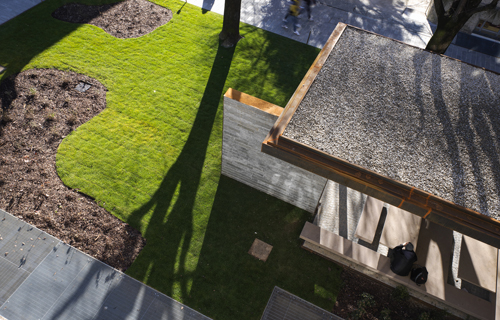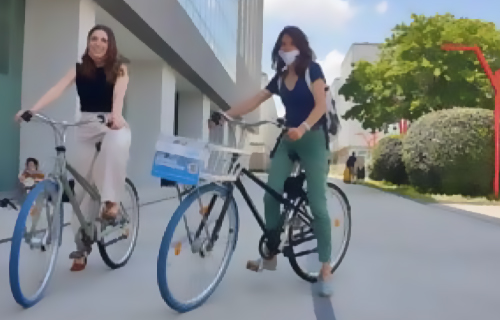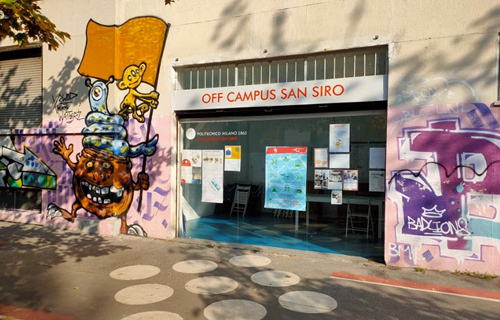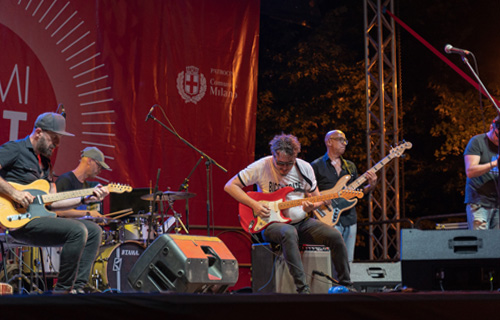Sustainable Cities and Communities
Politecnico di Milano aims at offering innovative and green spaces for studying, working and gathering, and at being a catalyst for open and accessible culture, keeping a close eye on the development and sustainability of the community in which it is located.
ViviPolimi

ViviPolimi aims at upgrading the quality of work, research and teaching spaces at Politecnico di Milano, bringing them into line with international standards and creating more interconnections between the university and the city:
VIVIPOLIMI@Green
VIVIPOLIMI@Health
Campus Sostenibile

A project that has been ongoing since 2011, aimed at redesigning the university campuses with the aim of offering a model for quality of life and environmental sustainability. To contribute to city and community sustainability, it develops projects to enhance soft and sustainable mobility.
Sustainable Mobility Action Plan
Sustainable mobility agreements
Polisocial

The social engagement and responsibility programme at Politecnico di Milano. They manage the Off Campus activities in the local community.
INTEGRATED MODIFICATION METHODOLOGY FOR THE SUSTAINABLE BUILT ENVIRONMENT
The course explores the urgency of practicing energy efficiency in design and modification of urban areas. As the starting point, the conceptual definition of sustainability (as an umbrella term) and the energy efficient strategies with which the goals of sustainable development are to be achieved are discussed, arguing the role of built environment in approaching energy efficiency. The Integrated Modification Methodology (IMM) as a systematic procedure for transforming the built environment into a more energy efficient system is introduced and its tools are demonstrated in the framework of the UN Sustainable Development Goals (SDGs).
This course is delivered in the following Degree Programme:
- Building and Architectural Engineering
Energy and Urban Planning
The studio provides basic knowledge on sustainability and resilience applied to urban planning, policies and design, and explores possible future scenarios for implementing sustainability in place through a practical application.
This course is delivered in the following Degree Programme:
- Urban Planning and Policy Design
FINAL SYNTHESIS DESIGN STUDIO
During the lab, students participate in the design of service-based solutions for a project of sustainable urban transformation in a metropolitan area, including multiple functions for health, work, dwelling, leisure, food, new manufacturing and park areas. The challenge for the students is to embrace the possibilities and constraints of the project, envisage an environment made for a multiplicity of uses and people, think many years ahead, imagine services that bring value to all the stakeholders be they residents, citizens, the developers, the public administration and city. All of this with an eye to the changing and unpredictable conditions of the city where we can expect longer periods of intense heat, extreme weather events, new laws about mobility, energy, waste and water.
This course is delivered in the following Degree Programme:
- Product Service System Design
Strategie per le sfide ambientali [Strategies for environmental challenges]
The course aims to develop the ability to analyse, solve and discuss multidisciplinary and complex problems in Environmental Engineering. Through practical cases, students will develop the ability to take into account the multiple characteristics of typical environmental problems, including the resources and constraints existing in the context of reference, the multiplicity of actors involved and the state of the art in the different disciplines involved.
This course is delivered in the following Degree Programme:
- Ingegneria per l’Ambiente e il Territorio [Environmental and Land Planning Engineering]
CLEVER Cities: Co-designing Locally tailored Ecological solutions for Value added, socially inclusivE Regeneration in Cities
CLEVER Cities, developed by a team of 34 international partners, aims to disseminate Nature-Based Solutions (NBS) in urban settings, through projects shared and co-produced with stakeholders and citizens. The aim is to promote more sustainable, inclusive and collaborative cities with the contribution of institutions, economic actors and citizens, able to optimise the use of urban green to combat climate change and increase citizens' well-being.
Scientific Coordinator: Eugenio Morello
INTERSOS: INTEGRATED NATURAL RESOURCE MANAGEMENT OF UNION OF TYRE MUNICIPALITIES
Project developed by the Department of Civil and Environmental Engineering and implemented in the South Governorate of Lebanon. It aimed at supporting the Lebanese and Syrian communities through the creation of water and sanitary infrastructures at family, community and institutional level.
Scientific Coordinator: Mario Grosso
SPREAD - Sustainable Lifestyles 2050
Carried out at the Department of Design, SPREAD develops sustainable lifestyle scenarios in Europe up to 2050, with the aim of defining a roadmap for innovation.
Scientific Coordinator: Anna Meroni
SSD – Smart Sustainable Districts Project
SSD – Smart Sustainable Districts project, started in 2021, involving more than 100 researchers from all the departments and consortium of the University (Polimi System).
The project wants to tackle the needs and to suggest actions for the sustainable development, the ecologic transition and the resilience of places and communities at a local scale, by defining a series of paths, actions and tools to deal with urban transformations at a local scale, considering sustainable and smart solutions.
Reference: Poliedra
Twin
Developed at the Department of Architecture and Urban Studies, TWIN deals with revitalisation of employment and economies in fragile areas through the development of support services for non-motorized tourism; recovery of unused real estate to host non-motorized tourism service functions; involvement, in the provision of non-motorized tourism services, of temporarily weak social categories, such as hospitality professionals who lost their jobs as a result of the 2016/2017 earthquake that hit Marche, Umbria and Lazio, and structurally weak ones such as people with disabilities, victims of violence or former convicts.
Scientific Coordinator: Paolo Pileri
VITAE: SUSTAINABLE VALORISATION OF THE ERITREAN HERITAGE ADULIS ARCHAELOGICAL SITE PROJECT
Project developed by the Department of Mechanical Engineering, with the aim of valorising the impact of long-term archaeological research and linking it to the promotion of sustainable development at local level.
Scientific Coordinator: Marco Bocciolone
Affiliations and Partnerships
| Festival dello Sviluppo Sostenibile (Sustainable Development Festival) |
| Festival dell’Energia (Energy Festival) |


